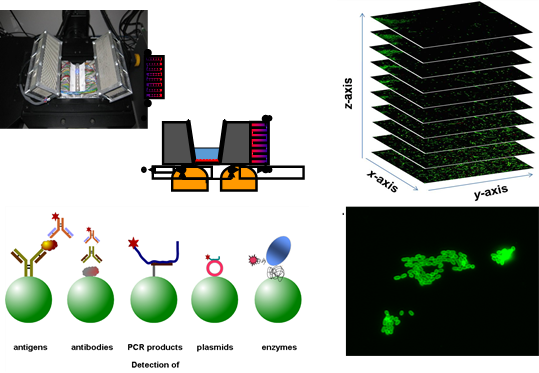
Our work is grouped around three main research areas: general microbiology, diagnostics of pathogens and autoimmune diagnostics.
We deal with the description of bacterial populations in humans, domestic and wild animals, the discovery of infection mechanisms of bacterial diseases and the description of bacterial resistance mechanisms. To answer the broad range of questions, we develop our own technologies and devices. In order to make more generally valid statements, we concentrate on detection methods that can process large numbers of samples ("screening") under standardized conditions and in a timely manner ("real time") while analyzing multiple parameters parallely ("multiplexing"). The work processes are continuously optimized for automation.
The methods developed for basic research are also adapted for use in medical diagnostics. We deal with biomolecules such as nucleic acids, antigens and antibodies, microparticles, microorganisms and eukaryotic cells. For each new question, assay-specific software modules are developed, which enables data evaluation and presentation. Generating and evaluating large amounts of data is the basis for assigning patients to special groups ("stratification") and thus to special treatment concepts in the future ("personalized medicine").
Our work is mainly supported by the Innovation Initiative of the Federal Ministry of Education and Research (BMBF) for the New States "Entrepreneurship Region". In addition, projects are financially supported by the EU, the Ministry of Science, Research and Culture Brandenburg and the DFG.
Close cooperation with industrial partners ensures that new technologies are researched and developed from the outset in line with market and industry requirements. This long-term fruitful cooperation, primarily with regional small and medium-sized enterprises, is the basis for establishing future-oriented new development projects.

